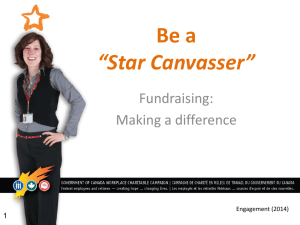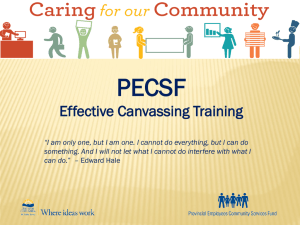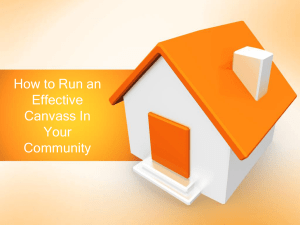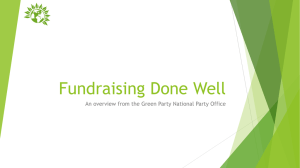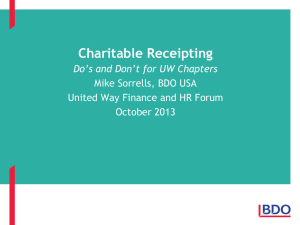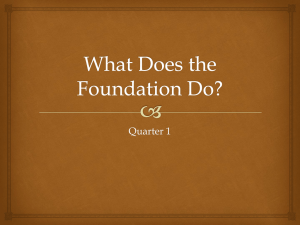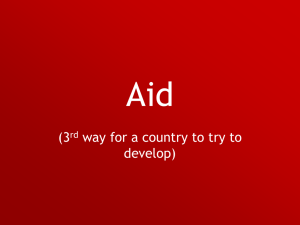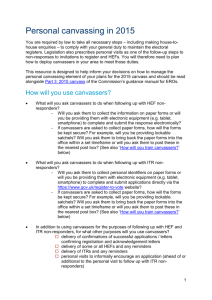Module 1 – Engagement - gcwcc
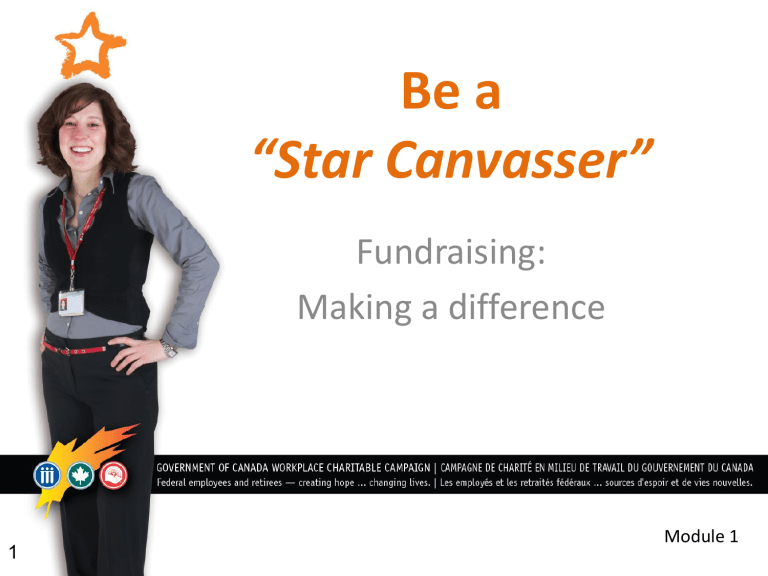
1
Be a
“Star Canvasser”
Fundraising:
Making a difference
Module 1
2
Objectives
• In less than 15 minutes, you will learn more about:
The GCWCC
Your role as a canvasser
How to engage and canvass your colleagues
How to assist people in making their donations
3
The Government of Canada
Workplace Charitable Campaign
The GCWCC is:
• An EMPLOYEE campaign: it is YOUR campaign
• The largest workplace campaign in Canada
• A donor choice campaign: Individuals can support
– United Ways / Centraides
– Healthpartners
– All Canadian registered charities
Did you know…
In 1997, Treasury Board selected United Way as manager of the GCWCC.
4
As a canvasser, you are…
• the link between the donor and charities
• the face of your department/agency’s fundraising efforts
•
• giving people the opportunity to invest in their own community enabling people to donate
Did you know…
Canvassing accounts for 92% of funds raised in the GCWCC.
That means that in 2012, canvassers like you raised approximately
• $20.5 million in the NCR and
• $35.7 million nationally!
5
Simply said, canvassing involves…
1. Introducing yourself
2. Asking if your colleague has any questions about the campaign
3. Asking if they would like to take this opportunity to donate through the GCWCC…
What works?
Sincerity, respect, and believing in what you are doing!
6
Benefits of being a canvasser...
This is what other public servants have said:
I better understand the difference between the
GCWCC and United
Way, and the complexity of the donation process
– Eric Beauchamp, CIEC
I was able to build on my skills and use them to benefit the greater community – Elida Persic, CRA
7
So, how do I go about canvassing?
Prepare … in 3 easy steps
Canvass… in 3 easy steps
Helping donors make their donation
Follow Up
Did you know…
The #1 reason people don’t give: They haven’t been asked!!!
Preparing yourself
8
1. Obtain your canvass list
– From your department’s GCWCC team
2. Introduce yourself to the people you will be canvassing
– Make sure that they know who their canvasser is – That’s you!
– Schedule a two minute “canvassing” meeting with them
Did you know…
Inspiration, facts and a call to action are key components to a good canvass.
9
Preparing yourself
3. Develop your canvassing strategy
– Have the FAQs: be ready to answer their questions
– Know some of the impact stories
•
to learn more about Jeremy, Herb and
Annie (slides 19, 20, 21)
– Donors respond to a variety of approaches – Next 4 slides
Did you know…
Facts and stats, FAQs and other supporting material can be found in Module 4.
Four approaches to consider…
10
• Benefits to the donor
• Charitable needs
• Uniqueness of the GCWCC
• Your customized approach
Remember:
You are not asking for yourself. You are asking on behalf of the community.
11
Approach: Benefits to the donor
THE FOCUS: What's in it for the donor
Include information about:
– The personal tax benefit for giving*
– The benefits of Payroll Deduction
– The benefits of consolidated giving
– How the GCWCC protects the privacy of donors
Did you know…
The GCWCC can advise your charity of your donation, upon request.
* Refer to the Charitable donation tax credit estimator
12
Approach: Benefits to the donor
The canvass could sound like one — or more —of the following…
Giving through the GCWCC is a one-stop shop for all you charitable giving! You can give to all your charities in one place, at one time
AND get a single tax receipt for all those donations.
With Payroll Deduction, there are no lost receipts! Your giving is included on your T4. And with the donations spread out over the year, from each pay, it’s actually easier for budgeting.
Charitable giving reduces your taxable income!
The Canada Revenue Agency’s Charitable donation tax credit estimator can help you know how much!
The GCWCC protects your privacy: there will be no direct mailing to your home and the donor lists are not shared.
Approach: Charitable needs
The Canvass: “I give because” …
THE FOCUS: Emotional Connection
• I made use of the [services/programs] (give examples of how you or someone you know has benefited from organizations supported
by the GCWCC); or
This would involve sharing true stories on
• Social justice: homelessness, poverty, domestic violence, abuse, hunger
• Health and well being: mental illness, disease prevention, research, integrated health, rehabilitation programs
• Community building: food bank, community centers, homework clubs, integrating immigrants, supporting seniors
• Your own experience
• It’s important to me to help others like
[Share a true story from a charity you
support. Examples can be found here
.]; or
• On average, 1 in 3 persons benefits from organizations supported by the GCWCC.
That means that we all know someone that has benefited from a charitable organization or health charity: it could be your mother, brother, cousin, neighbour, friend, or the clerk at the coffee shop.
I give because I want those services available to them … and to me.
13
Approach: Uniqueness of the GCWCC
THE FOCUS: the pride of giving
• Include facts about the scope and impact of the GCWCC
• Consider that in 2012, we raised
– $38.9 million nationally
– $22.3 million in the NCR; and
– The average donation in the NCR was $345
• Your campaign team will have specific information regarding your department/agency’s 2012 results
The canvass could sound like…
“Did you know that the GCWCC is the largest employee charitable campaign in Canada, and that federal public servants raised $38.9 M for charities last year?
In our department, employees raised $XXX. I’m proud to be a part of this effort, because it means that, together, we’ve helped… “
Give examples like
– fund school breakfast programs
– fund cancer research and
– help seniors stay in their home
14
15
Approach: Your Customized Approach
THE FOCUS : comfortable for you, and relevant to your donor
What would I like to hear?
• “Keep it real”
• Use a unique blend of any of these 3 approaches, or
• Modify your approach to make it resonate with your donor
Did you know…
That an ideal canvass is a Face-to-Face conversation.
16
Remember:
Canvassing … in 3 steps
1. Introduce yourself
2. Ask if they have any questions about the campaign
– Your preparation should enable you to answer most questions
– Listen to cues - different circumstances warrant different “approaches”
– If you are unsure of technical questions, let them know that you’ll find out and get back to them
3. Ask if they would like to take this opportunity to donate through the GCWCC …
Remember!
Donors can give through Payroll Deduction, cash, cheque or credit card
17
Three Possible Responses
Your colleague will respond in one of three ways …
1. Yes : Offer to assist the donor in completing their pledge
– If Yes, but “not right now”, follow up is required
2. No decision : Can I think about it? / Come back later …
– It is important to Follow up and Follow through
3. No: Respect their decision — it is a donor choice campaign
– Thank them for their time
18
Following Up – Following Through
• Give everyone a chance to give
– It’s important to get an answer from everyone — either a yes or a no.
• Tips:
– Track all your canvassing responses
• Revisit all “unanswered” or maybes on your list
– Ensure that all questions have been answered
Important!
If your colleague said “yes”, verify that they have completed and submitted their donation within your campaign timelines.
19
How can I assist people in making their donations?
• Read our other modules!
– They will provide you with information on how people can make their donations, and your role in helping them
• Make your donation first
– That way, you know how it works!
• Know how to access CRA’s searchable list of Canadian charities
Charities Listing website
– It is a Frequently Asked Question
Congratulations!
You’ve completed the first module of the Canvasser training!
Next Steps
• Read a little further to discover True
Stories of lives changed by donations
– Don’t forget to click on the pictures to access videos, bios and more!
• Access our other modules
20
True Stories
How donations help make a difference
(click on the images for more info!)
21
Making a Difference: LiveWorkPlay
Only 43% of people with a disability in Ottawa participate in the workforce, compared with 70% of our general population.
Jeremy found a job, a mentor and a meaningful life with help from
LiveWorkPlay, a United Way Ottawa priority goal partner that is helping people with disabilities find meaningful employment.
22
Making a Difference: Parkinson Society Canada
Parkinson Society Canada is one of 16 national health charities that make up Healthpartners . It provides education, support, and advocacy on behalf of over 100,000 Canadians living with
Parkinson’s, and funds innovative research to help expand knowledge on prevention, diagnosis and treatment in the hope of ultimately finding a cure.
Herb Durant: “I can be miserable and have Parkinson’s or I can be happy and have Parkinson’s — I’m still going to have Parkinson’s. I never used to have a positive outlook. In a way, Parkinson’s turned me into an optimist.”
23
Making a Difference: Centre d’intervention en abus sexuels pour la famille (CIASF)
While Annie still doesn’t speak since the day she told her mom, with therapy, she’s started singing.
The CIASF, a Centraide Outaouais funded agency, provides assistance and support to families and individuals confronted with child sexual abuse problems.
– With a gift of $40 per pay ($1,040 per year), you can help the CIASF host five group meetings for eight children and teens victims of sexual abuse.
24
Making a Difference: The GCWCC
A public servant, Rob , explains why and how he’s making a difference!
“Nocturnal hemodialysis has given me my life back. Without donations to support this program I wouldn’t be able to live a normal life” — Marie-Eve
With a gift of $6 per pay ($156 per year), you can help the
Petite-Nation food bank in providing comprehensive food relief for 10 days to a needy family, like Olivier’s .
Ayak is looking forward to a brighter future with the help of the summer literacy program and the homework club at the community house. “With help from the staff and the youth leaders I am getting better grades.”
Training Tip
• If you were viewing “Preparing Yourself” and jumped ahead to “True Stories”, please
and find out more about Canvassing.
• If you were viewing the “Charitable Needs Approach”,
this is the link that will bring you back!
26
Next modules
2. Giving online (through ePledge)
3. Giving using the paper form (Gift form)
4. Resources package
• FAQ
• Links
• Dates
5. Quiz, certification and evaluation
